- Home
- Anne McCaffrey
The Unicorn Girl Page 14
The Unicorn Girl Read online
Page 14
The sorters had come in when it got dark. They were supposed to light a fire and heat water to cook the evening beans and meal porridge, but half the time the sleep shed was dark and cold when the rest of the gang got there. This evening was one of those times. Laxmi and Ganga were bickering about whose turn it was to fetch sticks for kindling. Khetala waded in and sorted the argument with a couple of brisk slaps, sending Laxmi for kindling and Ganga to fill the bucket.
“What about her?” Laxmi jerked her head at the pallet where Chiura lay, chubby arms and legs flung out in exhausted sleep. “She don’t sort her share, she don’t help fix the fire…”
“She’s little,” Jana said. “She’ll learn. Give her a chance.”
“I say, if she doesn’t work, she doesn’t eat!”
“That’s dumb,” Jana said. “If she doesn’t eat, she’ll just get sick. I’ll help you get the dinner ready if you’ll give her a share.”
Her legs ached all over from hauling corves of ore all day, but walking and carrying kindling was a different kind of work anyway. It probably did her some good to stand upright for a while. Some of the older hewers hobbled around half bent, unable to straighten up after years of lying on their sides in wet tunnels to hack out the last ore in a narrow vein.
When they got the fire going and the water began to bubble, Khetala made Laxmi stir, even though Buddhe and Faiz complained that she would cough all over their food.
“Never mind them,” Kheti told Laxmi. “Steam’s good for the breath-sickness. You stir every night for a while, and lean over the bucket while you stir, hear? Breathe in that steam.”
“Why?” Laxmi whined.
“Easy,” Jana said before Khetala could lose her temper and slap Laxmi, which was how she usually settled disagreements. “Steam goes up, right? Sita Ram is Above, Old Black and the Piper are Below. Chest cough comes from Old Black and the Piper. Steam carries it up to Sita Ram.”
Khetala rolled her eyes but didn’t argue. “Just do it, Laxmi. Breathe the steam, and hope Siri Teku keeps you on sorting for a while and doesn’t make you drag a corf.”
“Right,” Jana agreed. “She goes Below, it’ll just give Old Black and the Piper another chance to lay a curse on her.”
Jana took Chiura to sleep beside her that night. She wouldn’t mind if Chiura cried, and she wouldn’t hit the kid the way Laxmi did. Anyway Chiura didn’t cry much; she snuggled in between Jana’s arm and body and burrowed her head into Jana’s armpit like a kitten butting its mother for milk. There’d been a litter of kittens once, all soft and fuzzy…but that was before the mines…. Jana blinked away tears. It didn’t do no good to think about before. That was the first lesson anybody learned. You were bonded to your gang-master, Siri Teku or whoever, and he took the cost of food and clothes out of your wages and kept the rest to pay off the advance your family had gotten for bonding you, and when you were paid off, you could go home or you could stay at work and send the money back to your family. It took a long time to get paid off, though. But it must happen for some kids. Sometimes kids just disappeared, and they weren’t sickly or anything, and you never saw them around the mine again, not working the other shift or working in another gang or whatever. Like Surya. She’d been a year older than Khetala, but she wasn’t on the gang anymore. So she must have earned out her bond and been sent home. Jana wasn’t sure what she would do when she earned out. She didn’t know how to find her family. She’d been too little when they bonded her—she only knew it was a long way off. They maybe wouldn’t want her back anyway; there were too many kids and not enough to eat. Maybe she’d go to the city and find some easier work. Anything had to be easier than dragging corves…. She fell into an uneasy dream of dragging bigger and bigger corves up a worse slope than any in the mine, with the Piper behind her dark and faceless and threatening, and her legs jerked and twitched all night as the overstrained muscles tried to remember how to rest. But whenever she woke up there was Chiura’s little body warm against her, and that was some comfort; almost as good as having a kitten of her very own.
The miners were tense as they followed Pal into the Li mansion, unsure what to expect. The house was darkened against the heat of the Kezdet sun, with cool, scented currents of air fanning though high-ceilinged rooms. They were still blinking with the sudden change from brilliance to shadows when the soft whir of a hover-chair heralded Delszaki Li’s arrival.
While Pal and Judit made introductions, Calum hung back, studying the man whose power and influence had brought them here. A wasted body was largely concealed under stiff, brocaded robes; all that he could see was the man’s wrinkled face, with sharp, intelligent eyes. Those eyes lit up when Acorna was introduced, and Calum tensed.
She is what he wants, he thought. The rest is just an excuse.
But his suspicions were lulled by the long, intense discussion that followed the introductions and ritual offering of food and drink. Li had evidently studied and anticipated all their tastes; there was Kilumbemba beer for Gill, chilled fruit juice for Acorna, and a variety of cold and refreshing drinks for Calum and Rafik. But the man was obviously eager to be done with social niceties and get on with his business; the clawlike fingers of one hand trembled over the hover-chair buttons while they made polite conversation. He seemed relieved when Gill downed his beer and said bluntly, “Now, Mr. Li, we have been promised some explanations. Exactly what made you so eager to bring us here, and why are you so sure we will accept your offer?”
“Require your assistance,” Li said, “to destroy illegal but well defended system of child slavery on this planet.”
“There are unpleasant rumors about the fate of unprotected children on Kezdet,” Rafik agreed.
“The reality,” Judit said, “is worse than the rumors.”
Gill put one arm around her shoulders.
“And exactly how will the establishment of lunar mining bases help to eradicate the current system?” Calum demanded. “And why us?”
“Second question is more easily answered than first,” Li replied. “I have chosen you because of personal reports from Judit Kendoro, also substantiated by reading of classified files of Amalgamated. Men who will break contract and incur wrath of intergalactic company to defend one child might be willing to take some further risks to save many children.”
Calum had the feeling that Li was not revealing all his thoughts, but then, the head of a multi-billion-credit financial and industrial empire seldom did reveal everything he was thinking.
“For answer to first question,” Li went on, “small introduction to current system is necessary.” He paused for a moment, his bright black eyes darting around the table until he was sure that he had everyone’s attention. “Kezdet, like Saturn, eats its children. Small population of highly paid technical workers, bureaucrats, and merchants rests at top of a pyramid of underpaid and exploited human labor. And at bottom of pyramid are children—those of Kezdet, and the unwanted children of many other planets. Kezdet labor contractors visit an overpopulated, impoverished world where planetary government is already struggling to provide basic social services. They make promises of employment and education for homeless children, training in basic job skills, and the chance for a better life. Reality is sadly different. Training? Yes—employers claim child is ‘in training’ for long years during which no wages at all are paid. Employment? Yes—as much as twenty hours a day in some cases. And education?” Li smiled sadly. “All most of these children learn is that if they do not work, they will not eat. And they learn that lesson very well. Illiterate, half-starved, separated from their families if they ever had any, they are utterly dependent on their employer’s good will. Enslaved children are backbone of kezdet economy.”
“Child labor and slavery are both violations of Federation law,” Rafik said. “Surely the law applies on Kezdet as elsewhere?”
Li’s smile was infinitely sad. “Inspections are always announced in advance, to give factory owners time to hide children or pretend they ar
e only working in allowed roles such as carrying water and snacks to adult workers. Kezdet Guardians of the Peace are paid, what you say, under the console?”
“Under the table,” Rafik supplied.
“Sometimes Child Labor League makes public some company’s violation of law. But judges are also paid off. Small fine, company continues business as usual.”
“It doesn’t make sense,” Calum protested. “Adult workers are stronger and do more. I’m sure conditions are terrible for the few children who have to work, but you make it sound as though they are the entire workforce.”
“Kezdet has specialized in industries where children are especially useful,” said Li. “In primitive mines, their small size is convenient. In glass factories, they can run faster than adults and calculate a path more intelligently than ’bots, bringing molten glass to blowers. Small nimble fingers are useful in match factories, where sulfur poisons them, and in carpet factories where children are crippled from hours of sitting in a cramped position and half-blinded from working in the dark. Adults,” Li said dryly, “might protest such conditions. Children provide cheap, uncomplaining labor. And Kezdet industrialists too tight-fisted and short-sighted for kind of capital investment it would take to modernize industries and improve appalling conditions. Children do here what machines do in more civilized places—and is always cheaper to buy another batch of children from a labor contractor than would be to automate a factory. System perpetuates itself. And children themselves are kept in perpetual slavery by system of financial juggling. Most bonded child laborers incapable of calculating ‘debt’ they owe for transportation to Kezdet and fee of contractor who brought them here. As legal fiction,” he explained, “debt is owed by adult head of child’s family, if such exists. Everyone knows debt is to be paid only by child—but cannot prosecute on basis of what ‘everyone knows,’ especially on Kezdet, where entire legal and peace-keeping system is corruptly in pay of factory owners. Meanwhile, employers cheat children in every possible way, charging food and clothing at ridiculous sums against their wages, docking for breakages, keeping high rate of interest on original debt. All bond laborers hope someday will work off bond. Very few ever achieve that.”
“I was lucky,” said Pal. “I had a sister who won her freedom with a scholarship, then spent years working hardship posts on space stations and sending back every penny of her salary until Mercy and I were bought free as well.”
“Success of Judit required brilliance, tenacity, and luck,” Delszaki Li said. “First element of luck was that she was not sent to Kezdet until she was fourteen, when she and Pal and Mercy were orphaned by a war that left their home planet burdened with thousands of displaced children. She fell into barrios of Kezdet later than most, with good health, a basic scientific education, and—most important of all—knowledge that a better way of life was possible. But none of that would have saved her if she had not been an exceptionally brave and intelligent young woman.”
“You don’t need to tell me that,” Gill rumbled. “Remind me to tell you sometime about the first time I met this girl.”
“But for every Judit who escapes the Kezdet system are hundreds of children who do not escape. Too poor, too weak, too ignorant to fight…”
“But what happens when they grow up?” Rafik demanded.
“Mostly,” Pal said, “we don’t. Grow up. What do you expect, with poor food, hellish conditions, no medical care? The healthiest and best-looking children are regularly bought from the labor contractors for city brothels, and even they don’t last long there. The rest work until they get sick, and then they die. And the few who survive to adult-hood are too weak to do much besides breed more children whom they can sell to the labor contractors for a pittance.”
Calum looked about him at the luxurious furnishings of the room where they sat: windows of high-tech Kyllian solar glass, walls draped in sound-absorbing Theloi silk, an entire wall covered with shelves of expensive antique flatbooks. Delszaki Li intercepted and interpreted his glance.
“No, this is not paid for by labor of children,” he said, “although you would be hard put to find another such house in all of Kezdet.” He sighed. “This humble person was young and idealistic when inherited family holdings on Kezdet. Swore never to employ child labor or any bonded laborers. Have devoted a lifetime to demonstrating that is possible for businesses to flourish—even on Kezdet—without exploiting children. Experiment has gained me many enemies, but has had no other effect. In recent years have turned to more direct action. Child Labor League achieved some successes at first, but now has been made illegal by order of Kezdet government, which has accused members of terrorist action.” Li smiled. “This means, among other things, that contributions to the league not tax deductible.”
“It also means that his house is watched, his assistants questioned, and his projects ruined wherever the corrupt Guardians of the Peace can find out what he is doing,” Pal put in.
“If this room is bugged,” Rafik pointed out, “this entire conversation is extremely indiscreet.”
“Is indiscreet anyway,” Li said calmly, “but I have made decision to trust you. As for other listeners, I believe my off-planet technology is still better than their off-planet technology. Guardians of the Peace are just as cheap as any other group on Kezdet; they buy second-rate espionage equipment and have it copied in barrio factories where workers do not know what they are supposed to be doing and hence make many mistakes…. Actually, it is remarkable how many mistakes they make on contracts for Guardians of the Peace; suspicious man might think someone were alerting them and suggesting subtle ways to sabotage equipment.”
“I like the way this man thinks,” Rafik announced.
“You would,” Calum said, “he’s almost as twisty as your Uncle Hafiz.” He glanced at Li. “No offense intended, sir.”
“If you are referring to Hafiz Harakamian,” Li said, “no offense taken. He is brilliant man with admirably subtle mind. Your people sometimes find subtlety morally suspicious; mine do not.”
“About the mines?” Gill prompted.
“Peaceful demonstration has failed,” Li said. “Education efforts on Kezdet have been hampered by Guardians of the Peace, who destroy com systems belonging to Child Labor League and break up schools established to teach bonded children how to read and calculate, so that they may know how much their employers are cheating them. Now I try third approach: direct action. Remove children from Kezdet. Only two problems: how to find children who have been well trained to hide from strangers, and what to do with them when found.”
“Just two little problems, huh?” Rafik drawled.
“You will solve second problem. Li consortium owns mineral rights to all three of Kezdet’s moons, sold to me personally by stupid government officials who thought moons too expensive to mine. Not willing to make capital investment, train modern workers. Li consortium has plenty of capital. You three men have expertise. You will establish first lunar base city on primary satellite, Maganos. You three will train freed children to operate equipment. Judit will be head of school system and medical services. Children will work, but will also learn.”
Gill blinked at the scale of the project presented in these few clipped words. “Mr. Li, I think you don’t realize how many trained personnel it takes to run an efficient lunar mining base. We’re contract miners, independents. We know how to strip an asteroid and ship the separated metals where we’ll get the most money for them. What you’re proposing is a much bigger operation.”
“I know that,” Li replied. “you do not realize how many children are enslaved on Kezdet. I will supply personnel. You will train them.”
“It’s going to be extremely expensive,” Calum warned. “Setting up shielded living quarters, importing equipment from other systems…it could be years before you see any return on your investment.”
Li waved his one working hand disdainfully. “Li consortium has capital. Initial return on investment will be lives saved. In fifty, m
aybe hundred years, will be fully working concern. Li descendants will be rich and happy. I will be dead, but will be one happy ancestor.”
Rafik asked Li for the chance to sleep on the proposition and Li smiled, murmuring something erudite about prudent men. Pal was designated as guide for the men while Judit took charge of Acorna.
As the three miners watched their ward make her graceful way up the anachronistic flight of stairs to the second level of this amazing house, they each experienced a sense of moment.
“She’s grown up…all of a sudden,” Calum said plaintively.
“She’s belongs in a place like this,” Rafik remarked, beaming with pride at the look of her, courteously inclining her body to the shorter Judit and smiling at something said.
“She’s grown out of us, that’s for sure,” Gill said with a sad sigh, and then focused his attention on Judit.
She’d cried when she thought we were all dead and gone. Who’d’ve thought it? They’d met so very briefly. He hoped Rafik and Calum would be willing to go along with Li’s scheme. He’d have a lot more chance to be with Judit and he found he wanted that, suddenly, at his time of life. Well, he wasn’t that old, after all was said and done. Time he gave a thought to settling down. Mining was a grand life when you were young, but it was isolating and he’d had enough of the females available for short-term liaisons. Would Judit mind that he’d played around a lot? He’d been careful: always insisted on seeing an up-to-date cert before he did anything.
“You’re right on that count,” Rafik said with a wistful expression on his face. Ah, well, they were due for a change.
Calum had entirely different thoughts, though they were centered on Acorna. They had man-aged to bring her to her species’ maturity, or close to it. But they hadn’t done what they ought to have done a long time ago: found out who and where her people were. Caring for her was one thing. He couldn’t fault any of them on that, but they really should now, especially with the resources available to them if they picked up on what Li was suggesting, be able to employ the experts they needed—discreetly, of course—to find her home system. They owed her family that. They owed her that. She was female and shouldn’t be deprived of a mate because a proper member of her own species wasn’t immediately available.

 The Renegades of Pern (dragon riders of pern)
The Renegades of Pern (dragon riders of pern)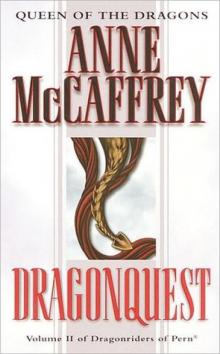 Dragonquest
Dragonquest Moreta (Dragonlady of Pern)
Moreta (Dragonlady of Pern)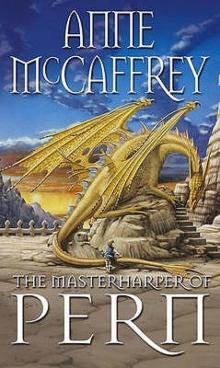 The Masterharper of Pern
The Masterharper of Pern If Wishes Were Horses
If Wishes Were Horses Dragonflight
Dragonflight No One Noticed the Cat
No One Noticed the Cat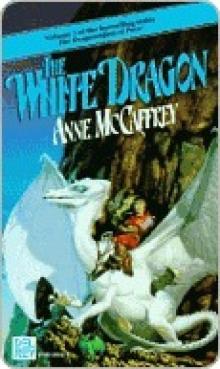 The White Dragon
The White Dragon A Gift of Dragons
A Gift of Dragons Harper Hall - Dragonsong
Harper Hall - Dragonsong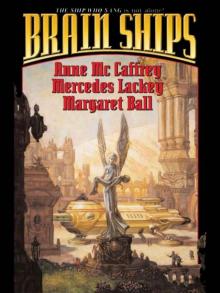 Brain Ships
Brain Ships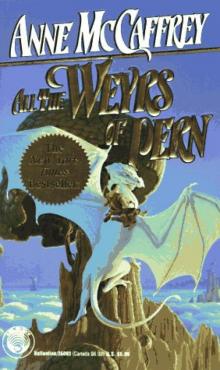 All The Weyrs of Pern
All The Weyrs of Pern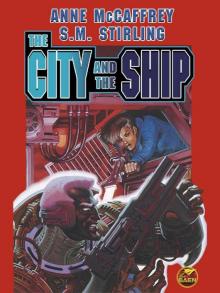 The City and the Ship
The City and the Ship The Chronicles of Pern: First Fall
The Chronicles of Pern: First Fall Acorna’s Search
Acorna’s Search Powers That Be
Powers That Be Second Wave
Second Wave Chronicles of Pern (First Fall)
Chronicles of Pern (First Fall) The Kilternan Legacy
The Kilternan Legacy Decision at Doona
Decision at Doona Dragondrums (dragon riders of pern)
Dragondrums (dragon riders of pern) Dragonsinger (dragon riders of pern)
Dragonsinger (dragon riders of pern) The Master Harper of Pern
The Master Harper of Pern Crystal Singer
Crystal Singer Acorna’s People
Acorna’s People Pegasus in Flight
Pegasus in Flight Sky Dragons Dragonriders of Pern
Sky Dragons Dragonriders of Pern Dragonriders of Pern 4 - Dragonsinger
Dragonriders of Pern 4 - Dragonsinger Treaty at Doona
Treaty at Doona Damia's Children
Damia's Children Stitch In Snow
Stitch In Snow The Rowan
The Rowan Dinosaur Planet
Dinosaur Planet The Year of the Lucy
The Year of the Lucy The White Dragon p-4
The White Dragon p-4 Power Lines
Power Lines Catacombs
Catacombs Moreta
Moreta Dragonsinger
Dragonsinger Crystal Line
Crystal Line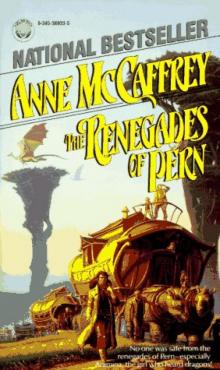 The Renegades of Pern
The Renegades of Pern Moreta - Dragonlady of Pern p-8
Moreta - Dragonlady of Pern p-8 Deluge
Deluge The Skies of Pern
The Skies of Pern Acorna's Quest
Acorna's Quest Dragon's Kin
Dragon's Kin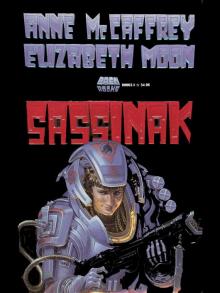 Sassinak
Sassinak![Crystal Universe - [Crystal Singer 03] - Crystal Line Read online](http://i1.bookreadfree.com/i1/03/31/crystal_universe_-_crystal_singer_03_-_crystal_line_preview.jpg) Crystal Universe - [Crystal Singer 03] - Crystal Line
Crystal Universe - [Crystal Singer 03] - Crystal Line Freedom's Landing
Freedom's Landing Acorna’s Quest
Acorna’s Quest Masterharper of Pern
Masterharper of Pern Restoree
Restoree Dolphins of Pern
Dolphins of Pern The Ship Who Saved the Worlds
The Ship Who Saved the Worlds Acorna's Triumph
Acorna's Triumph Acorna's Rebels
Acorna's Rebels![[Acorna 08] - First Warning: Acorna's Children (with Elizabeth Ann Scarborough) Read online](http://i1.bookreadfree.com/i1/04/06/acorna_08_-_first_warning_acornas_children_with_elizabeth_ann_scarborough_preview.jpg) [Acorna 08] - First Warning: Acorna's Children (with Elizabeth Ann Scarborough)
[Acorna 08] - First Warning: Acorna's Children (with Elizabeth Ann Scarborough) Dragonsong (dragon riders of pern)
Dragonsong (dragon riders of pern) Dragonriders of Pern 6 - Dragondrums
Dragonriders of Pern 6 - Dragondrums The Death of Sleep
The Death of Sleep Crisis On Doona
Crisis On Doona Nimisha's Ship
Nimisha's Ship Black Horses for the King
Black Horses for the King Changelings
Changelings Freedom's Choice
Freedom's Choice The Lady
The Lady The Coelura
The Coelura Catalyst
Catalyst The Unicorn Girl
The Unicorn Girl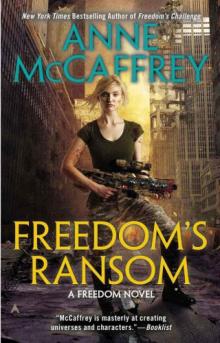 Freedom's Ransom
Freedom's Ransom Nerilka's Story
Nerilka's Story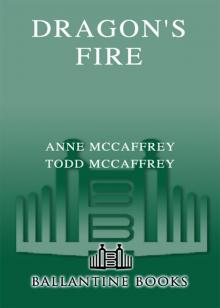 Dragon's Fire
Dragon's Fire Generation Warriors
Generation Warriors Lyon's Pride
Lyon's Pride Dragonseye
Dragonseye Dragon Quest
Dragon Quest Dragondrums
Dragondrums Dragonsong
Dragonsong The Mystery of Ireta
The Mystery of Ireta Dolphins' Bell
Dolphins' Bell To Ride Pegasus
To Ride Pegasus Power Play
Power Play The Dragonriders of Pern
The Dragonriders of Pern An Exchange of Gifts
An Exchange of Gifts The Ship Who Sang
The Ship Who Sang Sky Dragons: Dragonriders of Pern
Sky Dragons: Dragonriders of Pern Maelstrom
Maelstrom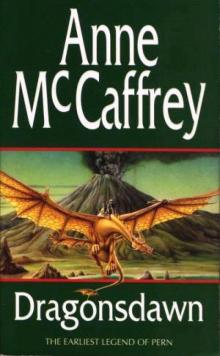 Dragons Dawn
Dragons Dawn Dragon Song
Dragon Song The Ship Who Searched b-3
The Ship Who Searched b-3 Damia
Damia Freedom's Challenge
Freedom's Challenge